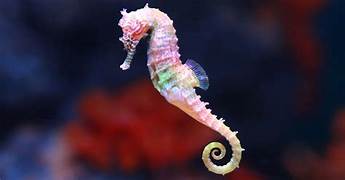Can You Have Seahorses as Pets?
Seahorses are fascinating creatures that capture the imagination with their unique appearance and graceful movements. While they may seem like an exotic and enchanting addition to a home aquarium, it's crucial to understand the challenges and responsibilities associated with keeping seahorses as pets.

Seahorse Care Requirements:
Habitat and Water Conditions:
1. Specialized Aquarium: Seahorses have specific habitat needs. They require a well-established, stable aquarium with plenty of live rock, macroalgae, and hiding spots.
2. Water Parameters: Seahorses are sensitive to water quality. Optimal conditions include a stable pH between 7.8 and 8.4, salinity of 30-35 ppt (parts per thousand), and temperature ranging from 72 to 78°F (22 to 26°C).
Feeding:
1. Live Food: Seahorses are obligate carnivores and require a diet consisting primarily of live food. They feed on small crustaceans, such as brine shrimp, mysis shrimp, and copepods.
2. Frequent Feeding: Seahorses have a high metabolism and need to eat several times a day. It's important to provide a continuous supply of live food or consider culturing live food at home.
3. Specialized Feeding Techniques: Seahorses have a unique way of feeding. They use their long snout to suck prey into their mouths, so it's crucial to ensure the live food is appropriately sized and easily accessible.
Health and Common Issues:
1. Susceptibility to Disease: Seahorses are prone to various diseases, including bacterial, viral, and parasitic infections. Maintaining pristine water quality and providing a balanced diet can help prevent health problems.
2. Stress-Related Issues: Seahorses are sensitive to stress, which can manifest in various ways, such as loss of appetite, decreased activity, and suppressed immune function. Creating a stable and peaceful environment is essential for their well-being.
3. Specialized Veterinary Care: If a seahorse becomes ill, it's crucial to seek specialized veterinary care from an experienced aquatic veterinarian. Treating seahorse diseases and conditions requires knowledge and expertise specific to these unique creatures.
Legal and Ethical Considerations:
1. Local Regulations: Before acquiring seahorses, it's essential to research and understand local regulations and restrictions regarding the keeping of marine life as pets. Some areas may have laws prohibiting or limiting the possession of certain species.
2. Sustainability and Conservation: Seahorses are facing conservation challenges due to habitat loss, overfishing, and the aquarium trade. Choosing captive-bred seahorses or supporting organizations working to protect wild populations can contribute to their long-term survival.
3. Responsible Pet Ownership: Keeping seahorses as pets is a significant commitment. It involves providing specialized care, maintaining a suitable habitat, and addressing their unique needs. Prospective owners should carefully consider their ability to meet these requirements before bringing seahorses into their homes.
In conclusion, while seahorses possess an undeniable charm, they are not suitable pets for everyone. Their specialized care requirements, susceptibility to disease, and ethical considerations make them a challenging choice for novice aquarists. If you're considering keeping seahorses as pets, extensive research, preparation, and dedication are essential to ensure their well-being and thrive in captivity.
Declaration: All article resources on this website, unless otherwise specified or labeled, are collected from online resources. If the content on this website infringes on the legitimate rights and interests of the original author, you can contact this website to delete it.





